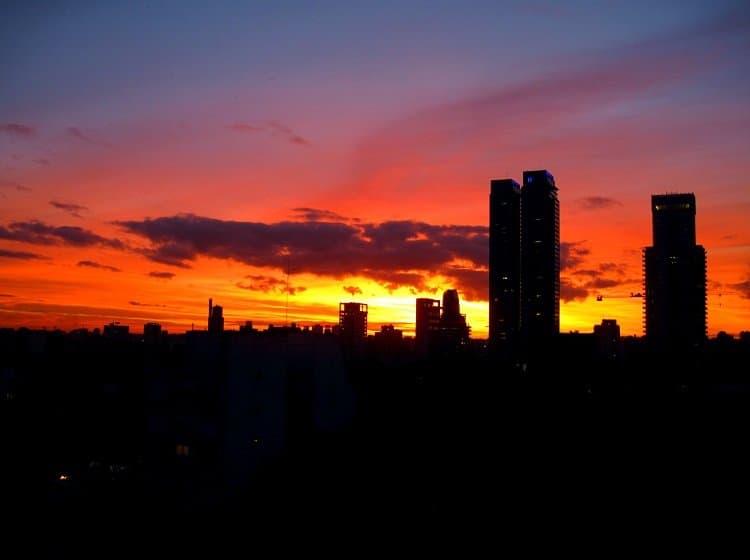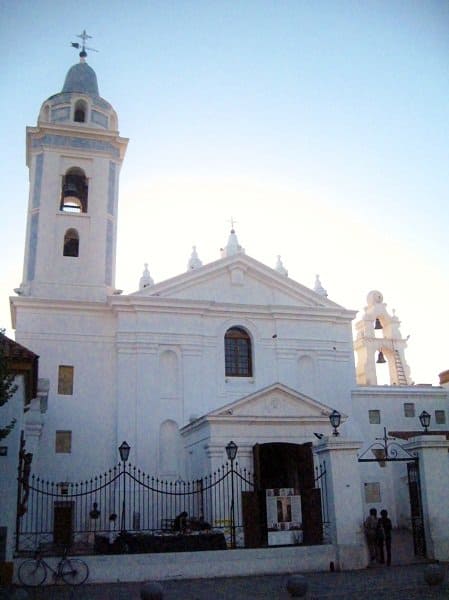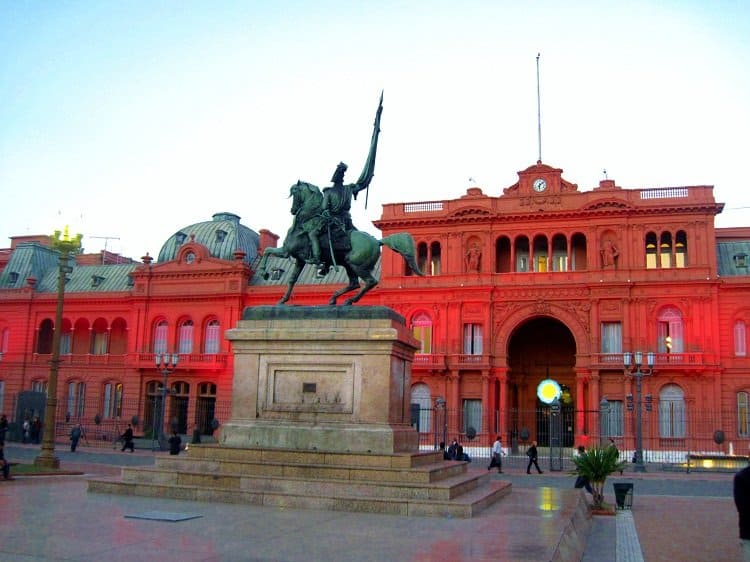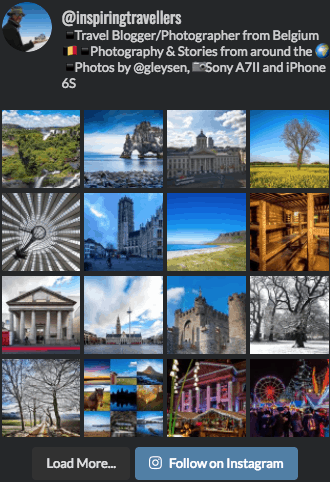We spent over five weeks in Argentina and explored the country from top to bottom. From the very beginning we knew it was a special country and we certainly succumbed to its charms. But here are some things that we weren’t prepared for.
1. The food isn’t great.
Prior to this trip a friend warned us that all we’d find to eat in Argentina was red meat and ham and cheese sandwiches. She wasn’t far off. Coming from Chile where we were spoilt by a variety of delicious dishes, fresh vegetables and seafood, the food was a real letdown. Yes, we love barbecued meats and the wine is incredibly good, but we also love variety in our diets. Excellent restaurants do exist here but they can be difficult to find and some of the “best” ones can be disappointing. Cities like Cordoba have far fewer restaurants than we are used to (sorry, resto-bars don’t count) and sometimes it was difficult to even get our beef cooked properly. And forget about ethnic restaurants like Thai, Indian or Turkish. John couldn’t even find a kebab (gyro) shop or decent late night eating spot in Buenos Aires after a big night out. Food is such a big part of our travel experiences and this affected our enjoyment of Argentina.
2. It didn’t seem very religious.
If Argentina’s population is 70-90% Catholic we really couldn’t tell. We’re not religious at all so this wasn’t a problem for us, but we couldn’t believe that the shopping mall in Cordoba was open on Good Friday. When we asked people what we could expect over Semana Santa (the Easter holy week) they gave us blank looks. Argentina also has very liberal social policies, which is a good thing. Gay marriages are legal, for example and marijuana possession is decriminalized as in Uruguay. While we did notice religious articles hanging from rearview mirrors in taxis and plenty of churches, religious demonstrations seemed minimal compared to other predominantly Catholic countries.
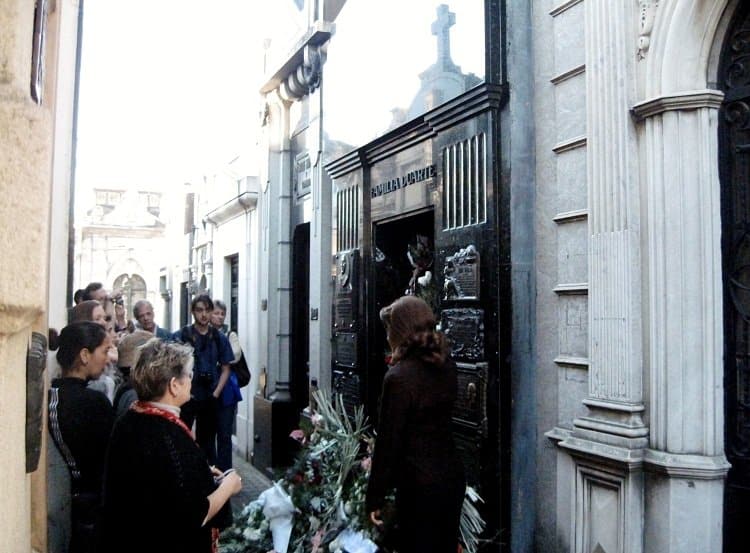
Visitors congregate around Eva Peron’s grave in the beautiful Recoleta cemetery. Guided tours are available.
3. People are friendly everywhere.
So many people told us that porteños (the people of Buenos Aires) would be mean and rude but we didn’t find this to be the case at all. A similar thing happened to us in Paris where we never had any problems with the locals. Perhaps our basic Spanish language skills played a part in our experience but everyone was friendly and helpful to us. Outside the capital we found the same. Yes, tourists can be taken advantage of by taxi drivers and thieves in the big cities, but most Argentines were welcoming. In fact, the people of Argentina were our favourite part of our experience there. People smiled at us and went out of their way to make sure we were happy. Even in Buenos Aires, which is just a big city with busy hardworking people like any other.
4. The poverty is palpable.
We aren’t economists and don’t know enough about the politics and financial situation of the country to make a fair comment about what is going on there. Once one of the richest countries in the world, Argentina is now a member of the third-world. Official statistics are considered by many to be unreliable and the inflation rate could be as high as 25 per cent. All we know is what we saw. In Cordoba, it was impossible to sit down for a meal without a steady parade of people coming in to beg for money as we ate. Children tried to earn money by separating our subway tickets at the counter. Homeless men slept on the street in the middle of the day in some of the better Buenos Aires neighbourhoods. Our Mendoza wine tour guide told us of other problems that are shielded from the eyes of most tourists. Prices, however, were high. We paid almost as much for clothing, hotels, flights and tours as we would in Australia. Despite these problems, however, we did feel safer than we thought we would in the country. A friend told us that her mobile phone was stolen right out of her hand while she sat in a taxi in Buenos Aires but we left the country (luckily) without incident.
5. English is spoken.
We highly recommend that travellers to Argentina learn at least basic Spanish (Castellano in Buenos Aires), but if you don’t it isn’t impossible to get around. In the tourist areas anyway. Hardly anyone spoke English in Neuquén and Salta, and a surprising number of people in Buenos Aires didn’t speak the language, but everywhere else we’d attempt Spanish and receive responses in English (with a smile). Argentines enjoy practicing their language skills and make a genuine effort to communicate with visitors. A server at a wine bar in Mendoza told us that they realize the necessity of being able to speak with their international guests. This is just one more way we felt welcome and cared for in Argentina.

This installation dominated a square in Retiro; we later found out that a huge book fair was going on in town.
6. We weren’t run over by a crazy driver.
Everyone warned us that pedestrians are invisible in Argentina (unless you’re a woman getting honked at) and crosswalks may as well be painted black. This is no word of a lie. Our only surprise was that we didn’t end up as road kill.
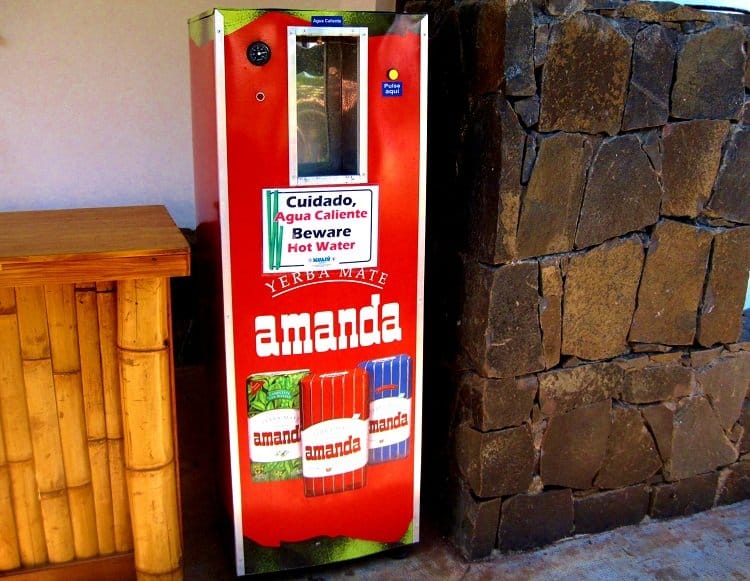
Mate is pretty much the national drink in Argentina. Hot water dispensers, like this one at Iguazu Falls, can be found all over.
Even if some of the above points sound a bit negative, we want to stress that Argentina is definitely worth a visit and we highly recommend putting more destinations on your itinerary than just Buenos Aires and Iguazu Falls. Bring a smile, some holas and a healthy amount of patience and you’ll have as much fun travelling there as we did.
In what ways has a country surprised you the most?
